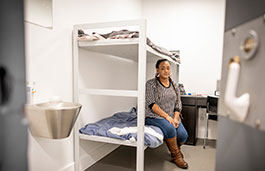Search
Psychology MSc
Study level: PostgraduateConversion course

Gain an understanding of human thinking and behaviour, and explore psychology within educational, clinical, counselling, and research settings with this accredited course.
Year of entry
Location
Coventry University (Coventry)
Study mode
Full-time
Duration
1 year full-time
Course code
CAST029
Start date
November 2025
January 2026
March 2026
May 2026
July 2026
Course overview
Explore psychological theories, research methodologies and real-world applications to gain a deeper understanding of human behaviour, cognition and emotion. If you’re looking to pursue postgraduate professional training in psychology, this British Psychological Society (BPS) accredited course could be ideal to help you advance your career in the field.
Key topics include:
- biological and cognitive psychology: understand the physical nature of the brain, its connections and computational models of human thought
- social and individual differences: explore key facets of human behaviour (such as personality and relationships) for both the individual and at the group level
- human development and diversity: examine human development from conception to end of life, with a focus on diversity
- independent research and ethics: develop your skills as an independent researcher. Master research design, data collection, analysis and reporting to create a project that aligns with your research interests.
5 QS Stars for Teaching and Facilities
QS Stars University RatingsRanked 9th Modern University in UK by the Times
The Times and Sunday Times Good University Guide 2025Ranked 4th for Overall Satisfaction in PTES
Postgraduate Taught Experience Survey (PTES) 2025Why you should study this course
This BPS-accredited course is your first step towards a career in professional psychology practice. Course content has been designed to prepare you for further study in professional psychological practice (clinical, counselling, forensics, education and sport) or a career in marketing, human resources, artificial intelligence (AI) or computing.
Professional accreditation: successfully completing this course to the required standard of accreditation means you will be eligible for the Graduate Basis for Chartered Membership of the British Psychological Society (BPS), which is necessary for further professional doctoral-level study. See accreditation for more information.
Innovative learning tools and dedicated technicians: access a range of psychology-specific programmes to support your studies, including statistical software and research methods software. Our dedicated psychology technicians are on hand to support you in experiment design, data analysis and use of psychology lab equipment.4
Expert teaching staff: learn from experienced professionals and researchers with strong industry links, including local schools, prison services, and clinical and counselling organisations. (Staff are subject to change.) Teaching is designed to reflect current trends and sector debates, ensuring a relevant and engaging learning experience.
Accreditation and professional recognition

British Psychological Society
This course is accredited1 by the British Psychological Society (BPS) for the 2025/26 intake and upon successful completion confers eligibility to apply for the Graduate Basis for Chartered Membership (GBC), which is the first step towards becoming a Chartered Psychologist. Graduates must pass all modules and achieve an average mark of at least 50% in order to be eligible for GBC membership.
Collaborations

Endorsement by the Royal Society for Arts, Manufactures and Commerce (RSA)
Coventry University and the RSA have collaborated on a module concerning social and ethical responsibility. You will be entitled to a 12-month fellowship of the RSA so you can access all RSA resources and platforms during your period of study. Once you have successfully passed the Project Planning and Ethics module, you will receive an RSA digital credential.
I’m delighted to say that I was awarded a 12-week internship at Coventry University working with the sigma Centre. The project looked at how to improve support for higher education neurodivergent students in maths and statistics. My internship involved creating the literature review for the research and thematic analysis on the questionnaire responses. The course has given me the breadth and depth of psychological understanding (developmental, biological, cognitive and social psychology) to enable me to understand the research papers I’ve been reading.
I used so many of the skills and knowledge that I learnt on the MSc Psychology course – the MSc Psychology team provide such a valuable course. I felt so well equipped to take on my internship due to the content of the MSc Psychology course.
Andrea Bradley, Psychology MSc student, 2023

What you'll study
Through research and methodologies, explore the mechanisms that shape thought, emotion and behaviour while examining the classic psychological theories that established the discipline. Gain a multi-perspective understanding of human experience, including cognitive and biological psychology, social and individual differences, development and human diversity. Develop your research skills in ethics and methodology, preparing you to pursue your own research interests with the support of a project supervisor.
We regularly review our course content, to make it relevant and current for the benefit of our students. For these reasons, course modules may be updated.
Teaching psychology at Coventry University has been the most gratifying life experience. Students love learning about different aspects of human behaviour and can connect their daily lives with the subject area. I have a particular interest and expertise in mindfulness and mental wellbeing. My teaching philosophy surrounds incorporating various elements of the ancient and modern mindfulness movement so that we can achieve the highest learning and life satisfaction.
Dr. Chetak Nangare, Lecturer in Psychology, Mindfulness and Compassion, 2022

How you'll learn
Teaching and learning methods may include:
- lectures
- seminars
- tutorials
- presentations
- group projects
- workshops.
Prefer to study 100% online? Click here to view our 100% online course.
Teaching and learning hours
As a full-time postgraduate student, you will study modules totalling 180 credits each academic year. A typical 30-credit module requires a total of 300 hours of study. Study hours are made up of teaching and learning hours, and guided and independent study.
Teaching hours
Teaching hours will vary, depending on where you are in your studies, but on average, you will have between 8 and 12 teaching and learning hours each week. You will also have the opportunity to attend optional sessions, including time with a Success Coach or to meet with staff for advice and feedback.
Guided and independent learning
Throughout your studies, you will be expected to spend time in guided and independent study to make up the required study hours per module. You will be digging deeper into topics, reviewing what you’ve learnt and completing assignments. This can be completed around your personal commitments. As you progress to the end of your studies, you’ll spend more time on independent learning.
Online learning
As an innovative university, we use different teaching methods, including online tools and emerging technologies. So, some of your teaching hours and assessments may be delivered online.
Assessment
This course will be assessed using a variety of methods which could vary depending on the module. Assessment methods may include:
- presentations
- independent projects
- essays
- multiple choice questionnaires
- portfolios
- case studies.
The Coventry University assessment strategy aims to ensure that our courses are fairly assessed and allows us to monitor student progression towards achieving the intended learning outcomes.
Entry requirements
Typical entry requirements:
Fees and funding
| Student | Full-time | Part-time |
|---|---|---|
| UK, Ireland*, Channel Islands or Isle of Man | £9,350 | Not available |
| EU | £9,350 per year with EU Support Bursary** £18,600 per year without EU Support Bursary** |
Not available |
| International | £18,600 | Not available |
For advice and guidance on tuition fees3 and student loans visit our Postgraduate Finance page and see the university's Tuition Fee and Refund Terms and Conditions.
We offer a range of international scholarships to students all over the world. For more information, visit our International Scholarships page.
Tuition fees cover the cost of your teaching, assessments, facilities and support services. There may be additional costs not covered by this fee such as accommodation and living costs, recommended reading books, stationery, printing and re-assessments should you need them.
The following are additional costs not included in the tuition fees:
- Any optional overseas field trips or visits: £400+ per trip.
- Any costs associated with securing, attending or completing a placement (whether in the UK or abroad).
*Irish student fees
The rights of Irish residents to study in the UK are preserved under the Common Travel Area arrangement. If you are an Irish student and meet the residency criteria, you can study in England, pay the same level of tuition fees as English students and utilise the Tuition Fee Loan.
**EU Support Bursary
Following the UK's exit from the European Union, we are offering financial support to all eligible EU students who wish to study an undergraduate or a postgraduate degree with us full-time. This bursary will be used to offset the cost of your tuition fees to bring them in line with that of UK students. Students studying a degree with a foundation year with us are not eligible for the bursary.
Facilities
The Richard Crossman Building is the primary home of psychology, criminology and social science subjects. Facilities include:
Light and dark multisensory labs
Explore how light and darkness affect behaviour, emotion and cognition. These specialist environments provide controlled yet adaptable spaces to learn about light, colour and perception.
Prison cells
Two furnished cells, one simulating a prison cell, and one simulating a custody cell, allow you to role-play real-life situations and put yourself in the shoes of prisoners and prison/police staff. Prisoner artwork is also on display.
Psychology lab
A suite of rooms with experimental equipment, such as eye tracking and EEG resources, to support neuro-psychological, physiological and biological psychological research for undergraduate and postgraduate students. Specialist software, such as Gorilla, OpenSesame experiment builder, E-Prime, SPSS statistical analysis, Pinnacle Studio and NVIVO allow you to develop your digital fluency.

Lanchester Library
The library is open 364 days a year. It’s where you can access your course’s specialist Academic Liaison Librarian. It’s also home to specialist teams which can support you with your academic writing and maths and statistics questions.

The Hub
The Hub is the centre of student life on campus. Facilities include a food court, convenience store, multi-faith centre, medical centre, hairdresser, coffee shops and the Your SU offices. It has fully licensed function spaces and a bar.

Careers and employability
Get one-on-one guidance lasting up to 18 months from the end of your course. We’ll help you find placements and graduate roles, offer CV and application checks, mentoring, skills workshops, employer events and more.
Facilities are subject to availability. Access to some facilities (including some teaching and learning spaces) may vary from those advertised and/or may have reduced availability or restrictions where the university is following public authority guidance, decisions or orders.
Careers and opportunities
Our Psychology MSc course aims to prepare you for a career in areas of psychology such as practising psychology (Chartered Psychologist), clinical psychology, counselling, health psychology, psychological research and further professional study and training.
In addition to psychology-based careers, you could consider future roles in marketing, human resources and management.
Where our graduates work
Graduates have gone on to work in teaching, human resources, management and a children’s hospital school, as well as roles including performance analysts, psychological wellbeing practitioners, human rights investigators and child development advisors.
Other graduates have also chosen to continue their psychological careers as either trainee educational psychologists, forensic psychologists or clinical psychologists on doctoral programmes. Some have opted to pursue a PhD and advance their academic career as a lecturer or research assistant.
How to apply
You may also like

Forensic Psychology and Mental Health MSc






